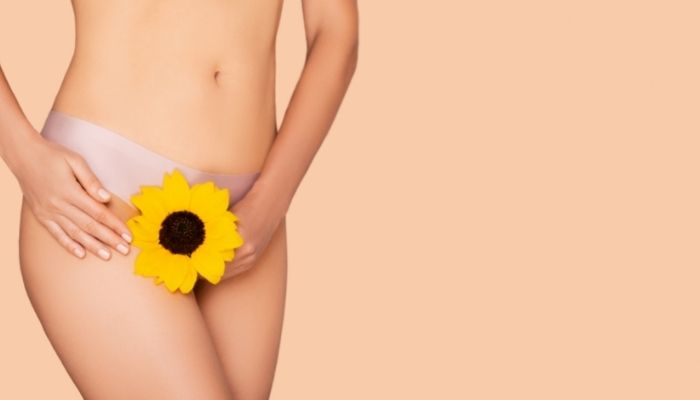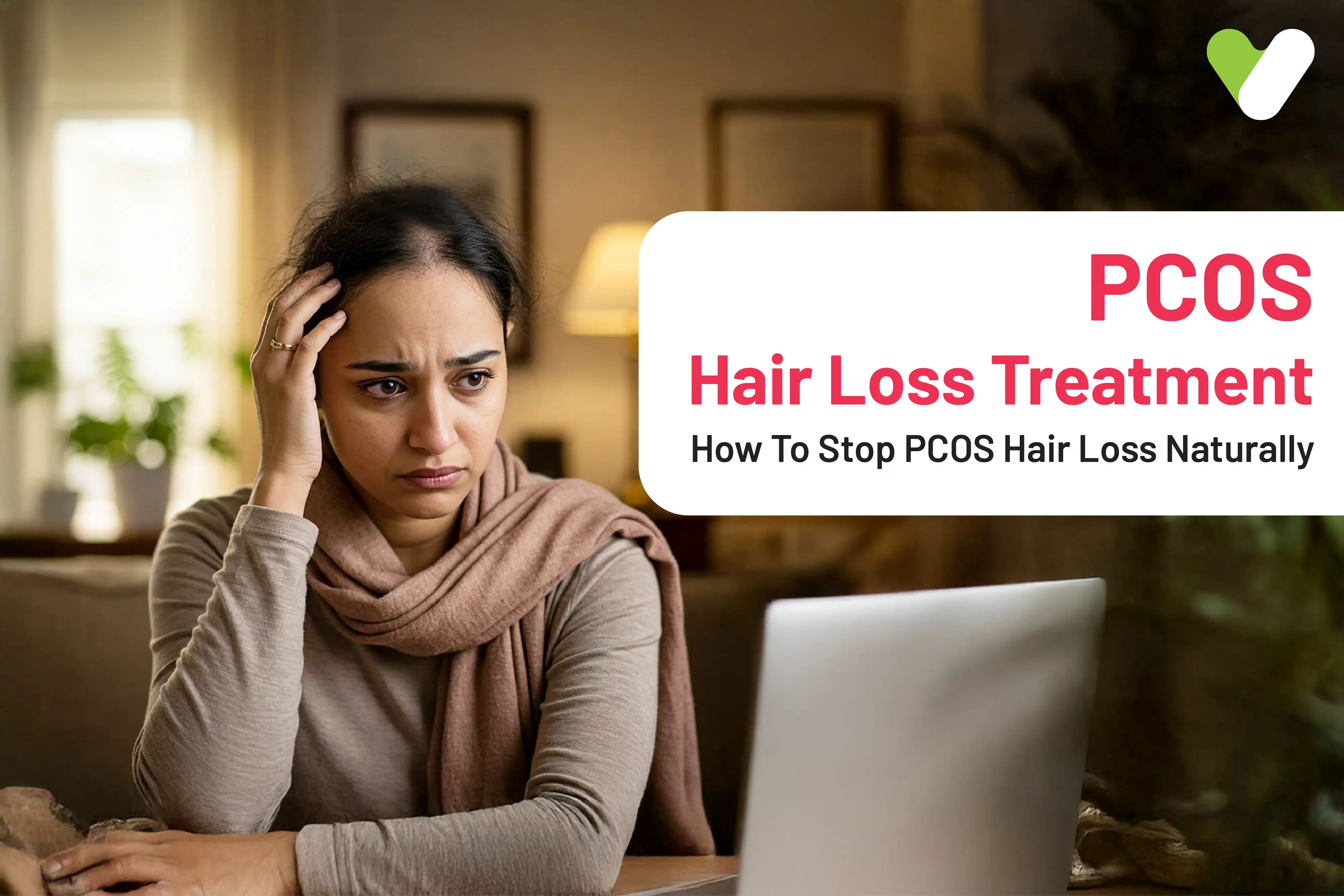Sharvari (21-years-old) is a final year engineering student in Pune. Sharvari has been diagnosed with PCOS over the past few months. Sharvari has noticed some symptoms like mood swings, hair thinning, face acne, etc. are becoming prominent even after taking medications. Her friend told her to try out PCOS hair loss home remedies to prevent hair thinning and loss because of PCOS.

Polycystic Ovarian Syndrome (PCOS) is a common problem in women. Common PCOS symptoms are hair loss, excessive facial hair, acne, irregular periods and many more. Hair loss is a common problem in PCOS and many women struggle to deal with it. But these days, many PCOS hair fall treatment methods prevent hair loss due to PCOS.
Why Does PCOS Cause Hair Loss?
Women with PCOS produce more androgens (male sex hormone). This condition is called as hyperandrogenism. Androgens stimulate hair growth in the underarms and pubic areas. In PCOS, women develop more masculine features including excess hair in face, neck, chest and abdomen.
In absence of progesterone, Dihydrotestosterone or DTG is one of the androgens that bind to your hair follicle receptors. DHT deteriorates your hair follicles, making it impossible for wholesome hair to grow and thrive. This is also called Female Pattern Hair Loss (FPHL) or DHT hair loss.
What Does PCOS Hair Loss Look Like?
- Hair strands are thinner and there is reduction in density, volume, and thickness
- Hair loss starts from the frontal hairline and forms triangular bald patches
- Hair color may turn into a lighter shade
- Hair looks damaged, frizzy, and less lustrous
- Dandruff builds up
- Scalps become itchy
When you wash your hair you may see a chunk of hair strands in your palm due to weaker follicles..
PCOS Hair Loss Treatment
If you are wondering how to fix PCOS hair loss, you have come to the right place!
Let us look into some common PCOS hair loss treatment options.
- Oral Contraceptive Pills
Doctors often prescribe birth control pills to treat PCOS symptoms. These pills reduce androgen levels and thus, reduce excess hair growth and slow down hair loss. These pills also work for other PCOS symptoms like acne and irregular periods. An anti-androgen medicine is often recommended along with oral contraceptives to treat PCOS hair loss.
- Spironolactone (Aldactone)
Spironolactone is an oral medicine that has an opposite action to an aldosterone receptor. It is good for treating androgenetic alopecia. This medicine blocks androgen effect on skin and is recommended with oral contraceptive.
- Minoxidil (Rogaine)
Minoxidil is the only FDA approved medicine for female pattern baldness. You need to use this topical medicine daily on your scalp. This medicine is helpful for healthy hair growth and increases hair volume.
- Finasteride (Propecia) and Dutasteride (Avodart)
Though these two medicines are FDA approved for male pattern baldness, some doctors may use them for PCOS hair loss.
Some studies have revealed that these two medications are useful in treating female pattern hair loss, but many experts believe that they may produce some side effects in women.
- Hair Transplant
A hair transplant is a procedure to implant hair on the scalp surgically. Hair and hair follicles are removed from an area where you have a lot of hair and transplanted into another area where your hair is thinning.
Also Read : Best PCOS Medicine
Natural Treatment For PCOS Hair Loss
If you want to know how to stop PCOS hair loss naturally, then there are arrays of home treatments that may help to lessen androgen levels, minimizing their effect on your hair.
- Zinc
A study was published in 2016 and according to it; zinc supplement is useful to treat PCOS-related hair loss. The study revealed that using 50 mg of elemental zinc daily for 8 weeks had advantageous effects on hair loss. Zinc supplement is also beneficial to deal with hirsutism.
- Biotin
Biotin is a popular supplement that is often recommended by experts for hair health and growth. It is one of the most effective natural remedies for PCOS hair growth. A study was published in 2015 and it was revealed that taking marine protein supplement (contains biotin) for 90 days improved astonishing hair growth among participants.
- Aloe Vera
Consume aloe vera juice daily as it removes toxins, reestablishes hormonal balance, and increases insulin sensitivity. Aloe vera restores ovarian steroidogenic activity status. If applied topically, aloe vera repairs and soothes your damaged hair. Several studies have also revealed that aloe vera deals with PCOS hair loss from within your body. There are very few home remedies for PCOS hair fall that are as good as aloe vera.
- Fenugreek Seeds
Fenugreek seeds contain high protein and nicotine. They are useful against your hair fall, dryness, thinning, and dandruff. The lecithin content in fenugreek seed hydrates your hair strands and fortifies the follicle of your hair.
- Shatavari
One of the biggest Shatavari benefits is that it retains LH and FSH hormones. This herb balances estrogen and progesterone hormones. These two hormones prevent hair loss and aid hair growth.
This herb restricts the formation of new cysts. It is also useful in dissolving existing cysts if it is used along with other medicinal herbs like Kanchnaar. Shatavari promotes follicular growth and development. This herb normalizes your menstrual cycle and improves ovarian and uterine health.
How To Fix PCOS Hair Loss
- Follow PCOS Diet
If you want to fight against PCOS and hair loss, watch your diet. Avoid milk and milk products, sugary products, deep fried items and caffeine. Consume unprocessed foods, vegetables, and seeds.
- Weight Loss
Weight loss reduces androgen levels and also other symptoms of PCOS. You can try yoga for PCOS and other low-intensity exercises to improve hair fall related to PCOS.
The Bottom Line
Estrogen and progesterone are two prime hormones for your hair growth. In PCOS, your ovaries produce a lesser amount of these hormones and release more male hormones that cause hair loss. You should change your lifestyle and diet to balance your hormones and invigorate hair growth. 


